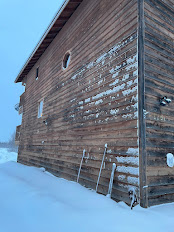When the holidays come with the music and the smells, the shopping and the crowds, the families all together, and the expectations that we will still try to be the jolliest fucking house on the block....it is the ass whooping we know is coming but we have no escape from. We don’t know when or what it will look like, but we know it is coming. It may be on Christmas eve when the kids come and that one chair remains empty. Or on Christmas day when we forget for just a second that they are gone and we say “Wait – we can’t start! We are missing someone!” and we are. And we will be forever now. It is the stocking hung, maybe…or not, because what do you put in there and where does it go afterwards?
For the past few years we have been putting up what I call the "Tiny Tree", and we have been using it as our only Christmas tree, other than outdoor one that has now outgrown its Christmas lights and needs to be updated. For the first few years after Rye passed, we didnt decorate at all and I don't even remember the first Christmas we had without him. It's all just a blur for about the first two years I guess.
I am sharing
this from the Facebook site “The Ugly Shoes Club” (Click the link to see thesite) because it really hits the nail on the head about how this goes,
especially at the holidays. Ours starts
at about Halloween….
The
gap between those who have lost children and those who have not is profoundly
difficult to bridge. No one whose children are well and intact can be expected
to understand what parents who have lost children have absorbed, what they
bear. Our children now come to us through every blade of grass, every crack in
the sidewalk, every bowl of breakfast cereal, every kid on a scooter. We seek
contact with their atoms – their hairbrushes, toothbrushes, their clothing (their Christmas Stocking).
We
reach out for what was integrally woven into the fabric of our lives, now torn
and shredded. A black hole has been blown through our souls and, indeed,it
often does not allow the light to escape. It is a difficult place. For us to
enter there is to be cut deeply and torn anew, each time we go there, by the
jagged edges of our loss. Yet we return, again and again, for that is where our
children now reside. This will be so for years to come and it will change us,
profoundly. At some point, in the distant future, the edges of that hole will
have tempered and softened, but the empty space will remain–a life sentence.
Our
friends will change through this. There is no avoiding it. We grieve for our
children in part, through talking about them, and our feelings for having lost
them. Some go there with us; others cannot and, through their denial, add a
further measure, however unwitting, to an already heavy burden. Assuming that
we may be feeling “better” 6 months later is simply “to not get it”. The
excruciating and isolating reality that bereaved parents feel is hermetically
sealed from the nature of any other human experience. Thus it is a trap–those
whose compassion and insight we most need are those for whom we abhor the
experience that would allow them that sensitivity and capacity. And yet,
somehow, there are those, each in their own fashion, who have found a way to
reach us and stay, to our immeasurable comfort. They have understood, again
each in their own way, that our children remain our children through our memory
of them. Their memory is sustained through speaking about them and our feelings
about their death. Deny this and you deny their life. Deny their life and you
have no place in ours.
We
recognize that we have moved to an emotional place where it is often very
difficult to reach us. Our attempts to be normal are painful, and the day to
day carries a silent, screaming anguish that accompanies us, sometimes from
moment to moment. Were we to give it its own voice, we fear we would become
truly unreachable and so we remain “strong” for a host of reasons even as the
strength saps our energy and drains our will. Were we to act out our true
feelings, we would be impossible to be with. We resent having to act normal,
yet we dare not do otherwise.
People
who understand this dynamic are our gold standard. Working our way through this
over the years will change us as does every experience– and extreme experience
changes one extremely. We know we will have actually managed to survive when,
as we have read, it is no longer so painful to be normal. We do not know who we
will be at that point nor who will still be with us.
We
have read that the gap is so difficult that, often, bereaved parents must
attempt to reach out to friends and relatives or risk losing them. This is our
attempt. For those untarnished by such events, who wish to know in some way
what they, thankfully, do not know, read this. It may provide a window that is
helpful for both sides of the gap.
From
My Special Angel: For Loved Ones Lost ![]()



.JPEG)





No comments:
Post a Comment